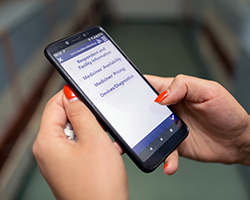Improving access to medicines in the Republic of Moldova

WHO/Igor Vrabie
The Government of the Republic of Moldova is committed to making progress towards universal health coverage (UHC) with the help of a new mobile application, developed by WHO. The app helps countries collect and analyse data on medicine prices and availability, aiding policy-makers. The data is used to help inform strategies which improve the availability and reduce the price of medicines, while also assessing the impact of health reforms.
Access to affordable medicines and other health products is a good indicator of progress towards UHC. It is vital to be able to measure and monitor the population’s access to medicines, and the government has worked with WHO to do so.
MedMon – the WHO Medicines Price and Availability Monitoring Mobile Application
“Good quality data, available in good time, are essential in improving policies and practices related to access to medicines,” says Larisa Amer, a pharmacist at Nicolae Testemițanu State University of Medicine and Pharmacy.
The Republic of Moldova is among the first countries in the WHO European Region to pilot the new mobile application, MedMon, designed by WHO to help countries monitor the availability and price of medicines for reporting on Sustainable Development Goal (SDG) 3.
Previously, paper-based data collection was a cumbersome process. The new MedMon app makes data collection and analysis easier, faster and significantly less expensive. In the Republic of Moldova, it has reduced data collection time by up to 1.5 hours per pharmacy, reduced the number of data collectors from 20 to 4 and allowed for access to the data in real time, improving the data validation process.
Gheorghe Gorceag, Head of the Medicines and Medical Devices Unit, Ministry of Health, Labour and Social Protection, highlights the importance of this data: “The medicines policy evaluation process takes on another dimension when the data is available in this way, allowing faster decision-making and opportunities for focused interventions”.
With this new tool, 4 data collectors were able to survey 60 settings in 2 weeks, including community, private and public pharmacies and primary health care centres, in rural and urban areas. They collected data on the price and availability of 50 medicines, with a total of 297 brand names. The medicines were selected based on national and international priorities through the SDG core tracer list.
The data collected is now under analysis by local experts with support from all levels of WHO: country office, regional office and headquarters. The findings will provide evidence for a national report on access to essential medicines in the Republic of Moldova, which will in turn evaluate the impact of policy interventions in pricing and reimbursement implemented in 2011–2018, before informing further policy development in this area.
Financial barriers
Ensuring affordable access to medicines and health products for everyone is central to UHC. One of the biggest barriers to affordable access to medicines and health products is that people have to pay for them out of pocket. New evidence from WHO/Europe shows how out-of-pocket payments lead to financial hardship for over 15% of households in the Republic of Moldova. This mostly affects the poorest households. The country has a heavy reliance on out-of-pocket payments, which accounted for 46% of spending on health in 2016.
The costs of health care and unmet needs are particularly problematic for people in rural areas. A WHO study on financial protection in the Republic of Moldova, set to be published in 2020, finds that over 70% of households with catastrophic health spending are in rural areas. Rural populations also face geographical barriers to access due to a lack of services in their locality.
The impact of these costs is clear, as is explained by Alexandru Zaporojan, farmer, Zaicana village, Criuleni district: “When I or my family is ill, I have to go to the district centre to buy medicines at the pharmacy. Sometimes, I get a special prescription from the family doctor and then I pay only a little for medicines. But usually, I do not have this prescription and I have to cover the full cost of medicines. As I am the only working member of the family, the cost of medication is a high burden for our household”.
Better data, through the MedMon app is intended to relieve this burden on families.
As the Republic of Moldova works hard to make progress towards UHC, this data collection and analysis tool increases efficiency. The information MedMon generates enables policy-makers to identify strategies to improve medicine availability and reduce prices, to assess the impact of health reforms and – alongside indicators of financial protection and unmet need – to demonstrate progress towards UHC.



